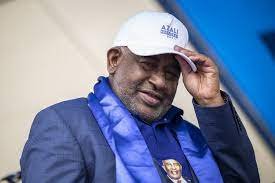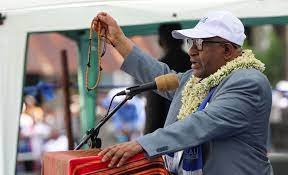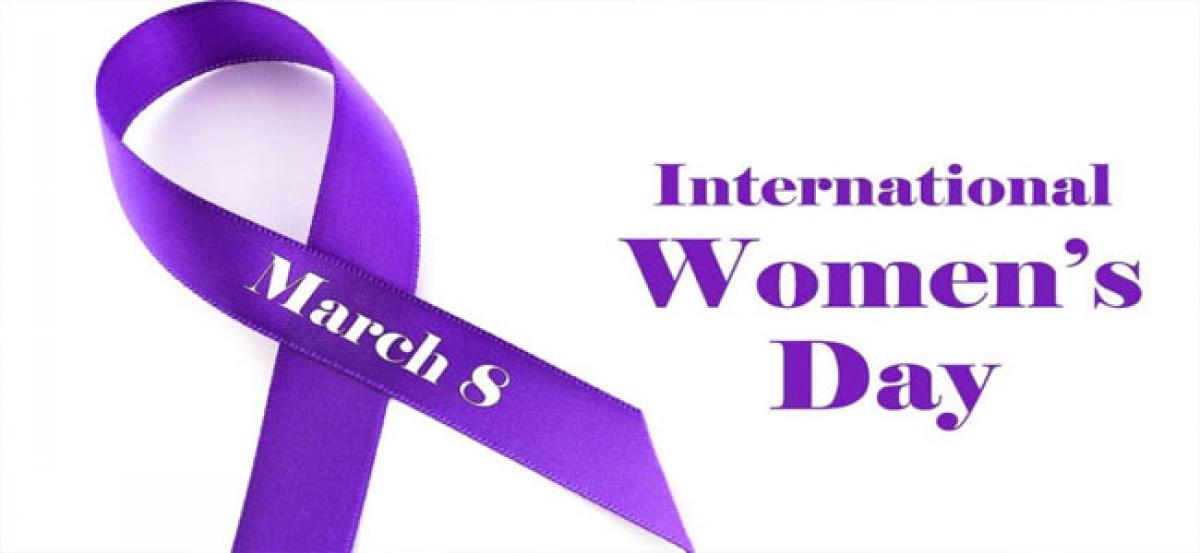Comoros President Azali Assoumani Secures Controversial Fourth Term Amid Opposition Dispute
In a recent turn of events, Comoros President Azali Assoumani has secured a controversial fourth term amidst opposition dispute, sparking both domestic and international concerns. The reelection of President Assoumani has stirred debates regarding the democratic process and political stability in the Union of the Comoros. This development comes amidst growing tensions and protests from opposition parties, alleging electoral irregularities and undemocratic practices.
Political Turmoil and Opposition Dispute
The reelection of President Azali Assoumani has plunged the nation into political turmoil, with opposition parties vehemently contesting the legitimacy of the electoral process. The opposition has accused the government of electoral fraud and suppression of dissent, leading to widespread protests and demonstrations across the country. This dispute has deepened existing divisions within the Comorian society and raised questions about the credibility of the electoral system.
International Concerns and Diplomatic Response
The controversial reelection of President Assoumani has attracted significant attention from the international community, with several countries and organizations expressing concerns over the democratic integrity of the process. International observers have called for transparency and accountability in addressing the allegations of electoral misconduct. Diplomatic efforts are underway to facilitate dialogue and reconciliation between the government and the opposition to ensure stability and democratic governance in the Comoros.
Challenges Ahead: Upholding Democracy and National Unity
As the Comoros grapples with the aftermath of the disputed election, the government faces daunting challenges in upholding democratic principles and fostering national unity. The legitimacy of President Assoumani’s fourth term remains a subject of contention, underscoring the need for inclusive dialogue and political reforms to address the grievances of all stakeholders. It is imperative for the authorities to prioritize the rule of law, respect for human rights, and the democratic rights of the citizens to safeguard the future stability and prosperity of the nation.
Way Forward: Towards Democratic Renewal and Reconciliation
Despite the current political uncertainties, there is hope for democratic renewal and reconciliation in the Comoros. It is essential for all parties to engage in constructive dialogue and compromise to find peaceful solutions to the ongoing crisis. The international community must continue to support the Comorian people in their quest for democratic governance and social justice. Only through collective efforts and genuine commitment to democratic principles can the Comoros overcome its current challenges and embark on a path of sustainable development and prosperity.

Why this News is Important
Escalating Political Crisis
The reelection of President Azali Assoumani amid opposition dispute highlights the escalating political crisis in the Comoros, raising concerns about the stability and democratic legitimacy of the government.
Democratic Integrity at Stake
The allegations of electoral fraud and suppression of dissent undermine the democratic integrity of the electoral process, posing serious challenges to the consolidation of democracy in the Comoros.
International Attention and Diplomatic Response
The international community’s attention to the situation underscores the significance of upholding democratic norms and principles, urging the government to address the grievances of the opposition through transparent and inclusive dialogue.
Implications for National Unity
The political turmoil risks exacerbating divisions within the Comorian society, threatening national unity and social cohesion. It is crucial for the authorities to prioritize reconciliation and inclusive governance to foster harmony and stability.
Opportunities for Democratic Renewal
Despite the challenges, the crisis presents opportunities for democratic renewal and reform in the Comoros. By addressing the underlying issues and promoting dialogue, the nation can emerge stronger and more resilient in its pursuit of democratic governance.
Historical Context
Background
The Union of the Comoros, an archipelago nation in the Indian Ocean, has a history marred by political instability, coups, and ethnic tensions since gaining independence from France in 1975. The country has experienced multiple changes in government and numerous coup attempts, reflecting the complexities of its political landscape.
Previous Political Crises
The Comoros has witnessed several political crises, including the secession of Anjouan and Mohéli islands in the late 1990s and early 2000s, which further exacerbated ethnic tensions and political divisions within the nation. These crises have often been fueled by disputes over power-sharing arrangements and allegations of electoral fraud.
Democratic Transition and Challenges
Despite efforts to transition to democratic governance, the Comoros continues to face challenges in consolidating democracy and ensuring political stability. The country’s electoral processes have been marred by irregularities and controversies, leading to recurrent political tensions and disputes.
Current Situation
The controversial reelection of President Azali Assoumani and the subsequent opposition dispute represent the latest chapter in the Comoros’ turbulent political history. The nation stands at a critical juncture, where the democratic principles and institutions are being tested, highlighting the need for concerted efforts to address the underlying issues and promote genuine democratic governance.
5 Key Takeaways from “Comoros President Azali Assoumani Secures Controversial Fourth Term Amid Opposition Dispute”
| Serial Number | Key Takeaway |
|---|---|
| 1. | President Azali Assoumani has secured a controversial fourth term amidst opposition dispute, sparking domestic and international concerns over the democratic process and political stability in the Comoros. |
| 2. | The reelection has triggered protests and allegations of electoral irregularities from opposition parties, highlighting deepening political divisions and challenges to the credibility of the electoral system. |
| 3. | The international community has expressed concerns over the democratic integrity of the electoral process and called for transparency and accountability in addressing the allegations of electoral misconduct. |
| 4. | The political crisis risks exacerbating divisions within the Comorian society and threatens national unity, underscoring the importance of inclusive dialogue and reconciliation to foster stability and social cohesion. |
| 5. | Despite the challenges, the crisis presents opportunities for democratic renewal and reform in the Comoros, emphasizing the need for concerted efforts to promote dialogue, transparency, and respect for democratic principles. |
Important FAQs for Students from this News
Q1: Why is President Azali Assoumani’s fourth term controversial?
A: President Azali Assoumani’s fourth term is controversial due to allegations of electoral fraud and opposition disputes, raising concerns about the democratic process in the Comoros.
Q2: What challenges does the Comoros face after the controversial reelection?
A: The Comoros faces challenges such as political turmoil, potential division within society, and the need for reconciliation and democratic renewal after the controversial reelection of President Assoumani.
Q3: How is the international community responding to the situation in the Comoros?
A: The international community is expressing concerns over the democratic integrity of the electoral process and urging transparent and inclusive dialogue to address allegations of electoral misconduct in the Comoros.
Q4: What historical context contributes to the political instability in the Comoros?
A: The Comoros has a history of political instability, including secession attempts and ethnic tensions, which contribute to the challenges in consolidating democracy and ensuring stability in the nation.
Q5: What opportunities for democratic renewal are highlighted in the article?
A: Despite challenges, the crisis presents opportunities for democratic renewal and reform in the Comoros, emphasizing the importance of dialogue, transparency, and respect for democratic principles.
Some Important Current Affairs Links


















